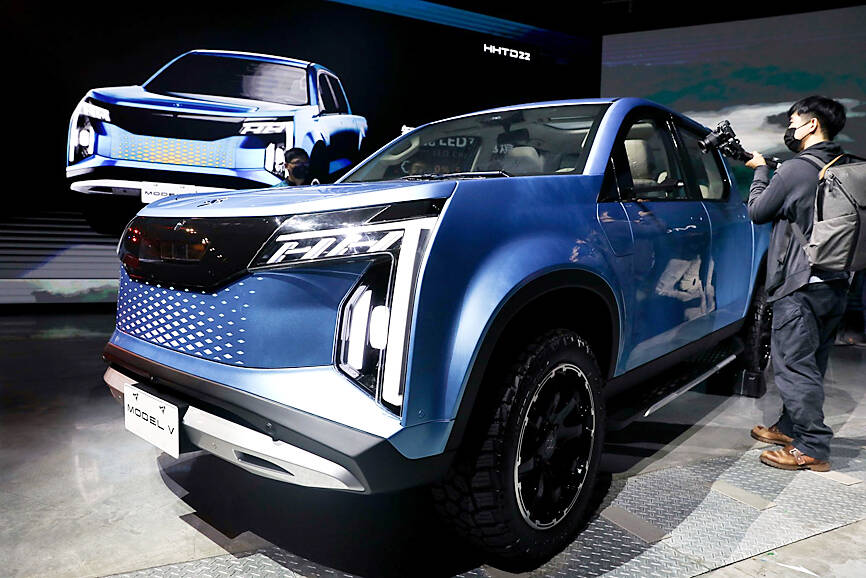Sales of fully electric vehicles (EVs) in Taiwan are to experience rapid growth over the next three years, expecting to account for about 30 percent of new vehicle sales as early as next year, jumping from 15.2 percent last year, the Industrial Technology Research Institute (ITRI, 工業技術研究院) said yesterday.
Sales of new EVs in Taiwan this year are to surge 31 percent year-on-year to 89,000 units, comprising about 20.3 percent of total sales of 438,000 new vehicles, the ITRI said.
However, that would be a 2.67 percent reduction in Taiwan’s vehicle market from an aggregate of 450,000 units last year, it said.

Photo: I-Hwa Cheng, Bloomberg
With a new model from Luxgen Motor Co (納智捷汽車) to be introduced next year, the ITRA said it expects new EV sales to rise 24.7 percent annually to 111,000 units next year.
Luxgen, Yulon Motor Co’s (裕隆汽車) own-brand car vendor, plans to launch its first all-electric sports utility vehicle, the Luxgen n7, next year.
The company has received more than 25,000 pre-orders for the vehicle, which is to be built using Foxtron Vehicle Technologies Co’s (鴻華先進) model C prototype.
New EV sales are to comprise 24 percent of total new vehicle sales next year and reach about 29.6 percent in 2024 after seeing a 22.52 percent year-on-year growth to 136,000 units, the ITRI said.
Overall new vehicle sales are to grow 2 percent to 458,000 units in 2024, it added.
With EV sales growing rapidly, Taiwan should build a resilient power grid given that the vehicles are likely to create a massive demand for electricity, ITRI president Edwin Liu (劉文雄) said.
There are expected to be 519,000 EVs on the road in 2030, consuming about 1.2 billion kilowatt hours each year, he said at a seminar in Taipei yesterday, citing Ministry of Transportation and Communications data.
Liu proposed adopting vehicle-grid integration technology to achieve Taiwan’s decarbonization and EV adoption goals and power requirements by 2050, after California launched a similar project.
The technology stabilizes a grid’s power supply through bidirectional charging, he said.

CHIP WAR: Tariffs on Taiwanese chips would prompt companies to move their factories, but not necessarily to the US, unleashing a ‘global cross-sector tariff war’ US President Donald Trump would “shoot himself in the foot” if he follows through on his recent pledge to impose higher tariffs on Taiwanese and other foreign semiconductors entering the US, analysts said. Trump’s plans to raise tariffs on chips manufactured in Taiwan to as high as 100 percent would backfire, macroeconomist Henry Wu (吳嘉隆) said. He would “shoot himself in the foot,” Wu said on Saturday, as such economic measures would lead Taiwanese chip suppliers to pass on additional costs to their US clients and consumers, and ultimately cause another wave of inflation. Trump has claimed that Taiwan took up to

A start-up in Mexico is trying to help get a handle on one coastal city’s plastic waste problem by converting it into gasoline, diesel and other fuels. With less than 10 percent of the world’s plastics being recycled, Petgas’ idea is that rather than letting discarded plastic become waste, it can become productive again as fuel. Petgas developed a machine in the port city of Boca del Rio that uses pyrolysis, a thermodynamic process that heats plastics in the absence of oxygen, breaking it down to produce gasoline, diesel, kerosene, paraffin and coke. Petgas chief technology officer Carlos Parraguirre Diaz said that in

Japan intends to closely monitor the impact on its currency of US President Donald Trump’s new tariffs and is worried about the international fallout from the trade imposts, Japanese Minister of Finance Katsunobu Kato said. “We need to carefully see how the exchange rate and other factors will be affected and what form US monetary policy will take in the future,” Kato said yesterday in an interview with Fuji Television. Japan is very concerned about how the tariffs might impact the global economy, he added. Kato spoke as nations and firms brace for potential repercussions after Trump unleashed the first salvo of

SUPPORT: The government said it would help firms deal with supply disruptions, after Trump signed orders imposing tariffs of 25 percent on imports from Canada and Mexico The government pledged to help companies with operations in Mexico, such as iPhone assembler Hon Hai Precision Industry Co (鴻海精密), also known as Foxconn Technology Group (富士康科技集團), shift production lines and investment if needed to deal with higher US tariffs. The Ministry of Economic Affairs yesterday announced measures to help local firms cope with the US tariff increases on Canada, Mexico, China and other potential areas. The ministry said that it would establish an investment and trade service center in the US to help Taiwanese firms assess the investment environment in different US states, plan supply chain relocation strategies and